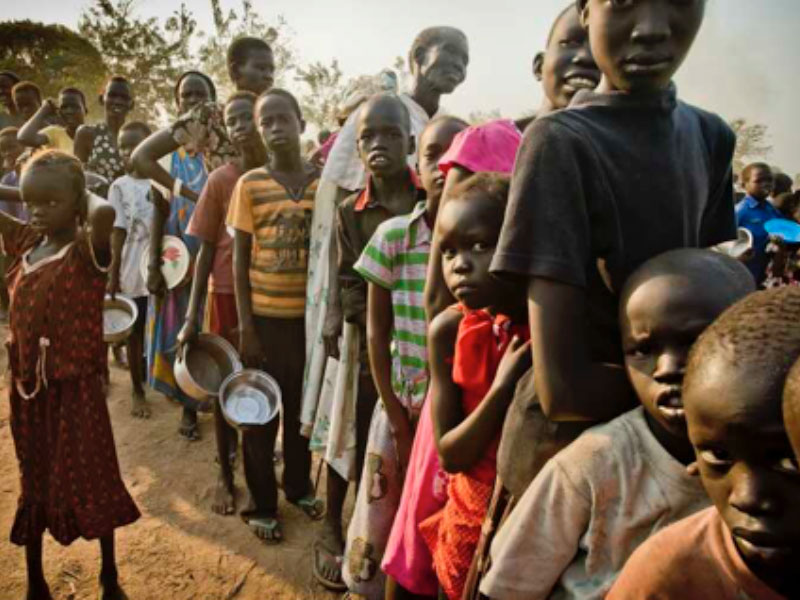By Suyi Ayodele
The food you give to a slave is not to make him grow fat, but for him not to die (Oñje tí a ñfún erú, ki i se ki o baa sanra, ki o ma baa kú ni)! That was the closing remarks of Òsúntúndé, a character in the Yoruba epic drama, “Efunsetan Aniwura”. Òsúntúndé, one of the male slaves of Efunsetan Aniwura, the Iyalode of Ibadan, gives this line while discussing the parlous conditions of the slaves in the household of Efunsetan. Most of our leaders are just like Efunsetan Aniwura, or even worse than the legendary Iyalode of Ibadan, whose reign of terror and wickedness was terminated by Obadoke Latoosa Oyatoosa, simply, Aare Latoosa (c. 1820-1885). Latoosa, as the Aare Ona Kakanfo of Oyo Empire, had to rise to the occasion after Efunsetan, against all pleas, executed her female slave, Awero, who was put in the family way by one of the male slaves, Itawuyi. An attempt by Itawuyi to save his lover, Awero, also resulted in his death. That incident was the last Ibadan would take from a female overlord. Latoosa moved in and Iyalode was captured and made to sweep the Aare’s compound. Efunsetan died a sad woman on June 30, 1874. The entire Efunsetan’s reign of terror is recorded in the drama, “Efunsetan Aniwura”, written by the most prolific raconteur and literary icon, the late Professor Akinwumi Isola (December 24, 1939-February 17, 2018). Many have argued that Efunsetan was not as horrible as she is portrayed in the drama. Not a few believe till date that Iyalode Efunsetan was simply a victim of the “dominance of the phallus over the clitoris”. Interestingly, the playwright, Akinwumi, also agreed that if he had had access to the information he had later in life as against those available to him when he wrote the drama as an undergraduate (1968), he probably would have given a less notorious character portrait of the Ibadan strong woman. The arguments notwithstanding, the life of Iyalode Efunsetan Aniwura as depicted in the play, especially the miserable meals she served her slaves, mirrors how our present ruiners treat Nigerians, their conquered serfs.
There is a book “they did not want us to read.” That was how my late cousin and mentor, Ayegbusi Rufus Akanni (ARA), put it when he presented a copy to me as a gift, in 1989. The title is: “Just Before Dawn” (JBD), and the author is the inimitable writer, Kole Omotoso (Bankole Ajibabi Omotoso, April 21, 1943-July 19, 2023), who in his later domain, South Africa, was known as “Yebo Gogo Man”. JBD was not just a gift. I had instructions to read every episode of the narratives in the book and give a summary of each event according to my understanding. It was an order I carried out ‘compulsorily by force’! Why my late cousin decided to give me the book and asked for the tasking summaries, I cannot say. Needless, however, to say that I treasured the book, lent it out to so many people and had to rebind it when it was getting overused. Fortunately for me, I got a ‘new’ copy (obviously a pirated version) from a popular bookseller a few months ago. Omotoso’s JBD is the political Bible of Nigeria. In it, readers are given the ‘expo’ of how our rulers see the masses. On page 199, while introducing the politics of the Ibadan maverick political icon, the late Chief Adegoke Adelabu, aka, Penkelemes, Omotoso says “Adegoke Adelabu lived for the people.” Penkelemes gave a unique definition of the poor of the poor in Nigeria. He used the euphemism, “masses”, for them. To the man and his bombastic grammar, the masses “are known by their wants, distinguished by their disabilities and conspicuous by their incapacities.” Perfect definition! The First Republic politician knew that the poor must be saved from total annihilation by the serpentine rulers, and he had his own means of achieving that. Again, here is what Penkelemes said: “An overdose of doctrinaire socialism without a judicious admixture of progressive conservatism, of orthodox liberalism and of that centre-stabilizing process, leads inevitably to communism, to totalitarianism, to regimentation and to fanatical, ideological and doctrinal intolerance of opposition.” My Goodness! Forget the magniloquence and orotundity (I don’t want to copy the old lexicographer) of the dictions. No one can deny that for the Nigerian masses of today to be delivered from the knees of their leaders on their necks; they need exactly what Adelabu saw over 50 years ago! The poor Nigerians are on the crag. Their situation is iffy, a la Penkelemes.
Experts in the study of Standard Nigerian English (SNE) such as Ayo Bamgbose, Ayo Banjo, Festus Adesanoye, Andrew Thomas, David Jowitt, and many more, are united in their assertion that one of the basic features of SNE at the Lexico-Semantic level is “Semantic Shift or Extension”. This sociolinguistic term simply means that the semantic range (meanings) of a word can be restricted or narrowed and shifted or extended depending on the environment it is used (Contextualisation). When this is done, the hitherto original meaning of that word in its native First Language (L1) usage, assumes a different meaning in the Second Language (L2) situation. If there is anything that the locusts we have as leaders have contributed to the advancement of knowledge in the present political dispensation, it is the new meanings they have given to some lexicons that crept into the codification of SNE. When a man without teeth is given an Akara to eat, the tendency that it will turn to bone is high (Akara de enu akayin di eegun). A word that hitherto has simple and uncomplicated meaning, has assumed a different semantic interpretation in contemporary Nigeria. I am talking of the word “palliative”, which became even more popular during the COVID-19 pandemic, but which gained prominence after the May 29, 2023, misadventure of President Bola Ahmed (Adekunle) Tinubu in announcing the removal of fuel subsidy without any plan to address the multiplier effects on the lives of the poor people. Desperate for a solution to the devil-may-care announcement, the government introduced what it called “palliative” to cushion the effects of the untold hardship Nigerians are subjected to. The first of such attempts was the now abandoned N8,000 per “vulnerable household” by the government. Following the outcry that greeted that venture, which not a few Nigerians regarded as a veiled scam, the government changed gear and announced that it would be giving each state the sum of N5,000,000, 000 to buy “palliatives” for the “vulnerable households” in the states across the federation. For a proper understanding of what those in government are doing to us, let us impose on ourselves here, a simple exercise in semantics to have a full grasp of the most abused word, “palliative”.
Shorter Oxford Dictionary (Sixth Edition) describes “palliative”, among other definitions, as: “A thing which gives superficial or temporary relief…” (Page 2079). On its part, Webster’s Universal Dictionary & Thesaurus defines it as: “Alleviating without curing” (Page 348). The International Webster’s Comprehensive of The English Language (Deluxe Encyclopedic Edition) describes it as “That which serves to palliate”, with the definition of “palliate” given as: “To relieve the symptom or effects of without curing…” (Page 909). Of all the definitions, the one I consider best as it relates to the current shenanigan of the government at pulling the wool over our faces is the definition by Cambridge Dictionary, which says “palliative” is “making a problem seem less serious but not solving the problem or making it disappear”. This is exactly the drama of the absurd Nigerians were made to behold on Saturday, October 14, 2023, when the Governor Dapo Abiodun government in Ogun State sent a 10kg bag of rice to the Shokeye Community Development Area (CDA), to be shared to the “vulnerable” households in the CDA. An unnamed man, who apparently is one of the leaders of the CDA, decided to call out the governor in a video, which has since gone viral. The man, who is the chief narrator in the video, displayed the branded 10kg bag of rice and asked how he was expected to share the rice to the “147 households in Shokeye Estate.” The livid resident noted: “In this estate, we have 147 houses with families and tenants. I’m confused now; I don’t know how to share this with 147 households in Shokeye Estate. I’m talking to Dapo Abiodun now; if you people know that you cannot do something, then don’t do it. We are not hungry; we are not beggars. So, we don’t need your rice as palliative. This is not even up to one-eighth of a bag of rice. We don’t need this rice; if you want to give us palliatives, don’t insult us. This is an insult. Shokeye Estate refuses to be insulted.” He advised the governor to return the rice to President Tinubu; that they should go and give it to their children.
Of course, sending a 10 kg bag of rice to an estate with 147 houses is nothing but ‘insult upon injury’ (what does that mean?)! Expectedly, the government came up with its predictable doltish explanation, the best of risible excuses anyone can offer! The usual culprit is the irritating cliché; “handiwork of the fifth columnist”. Lekan Adediran, the Chief Press secretary (CPS), to Governor Abiodun, while responding to the video, said that some agents of the opposition simply wanted to blackmail the governor. But he admitted that the government sent the wretched 10kg bag of rice to the CDA. Hear him: “This man is aware that the bag of rice is meant for one vulnerable family in the community, and not for all the residents. It was sent to him as the Chairman for onward transfer to a vulnerable widow in his community. But, instead of ensuring that it gets to the intended beneficiary, he chose to play politics with the palliative, exposing himself as the destructive opposition agent that he actually is…. He clearly got it wrong thinking that the government was ready to provide enough bags of rice that would go round every family in his community.” I want to believe that Adediran did not show the draft of his press statement to his principal before releasing it. What type of explanation is this? Did the government specify the particular “vulnerable widow” the rice was meant for? Or the CDA chairman was asked to use his discretion to identify the most “vulnerable widow” in an estate with 147 houses? How many such widows do we have in Shokeye Estate, for instance? How did Adediran and Governor Abiodun arrive at the conclusion that the “most vulnerable” person in Shokeye Estate, CDA, must be a widow? Are all widows poor, or are all vulnerable people widows?
The drama over the “government magic” called ‘palliative’ did not start with Governor Abiodun’s rice of poverty. While it is safe for Governor Abiodun to tag his Shokeye Estate CDA rice saga as handiwork of his political enemies, Arakunrin Rotimi Akeredolu of Ondo State cannot say that with what happened on September 17, 2023, at Arigidi Akoko, where his Commissioner for Women Affairs and Social Welfare, Juliana Osadahun, was beaten to a pulp over the sharing of palliative in the locality. In the video of the event, the All Progressives Congress (APC) chairman in one of the wards in Akoko North-West Local Government Area, Olumide Awolumate, was seen hitting the commissioner with a chair. Osadahun was badly injured and the party subsequently suspended Awolumate, a man whose name, when fully pronounced, says he is not disgraced when he enters the town because he knows his limits (Awolumate-iwon-ara-re-lo-mo).
As the APC ward Chairman, Awolumate was upset by the distribution formular for the ‘palliative’ rice sent to his domain, where the commissioner is the chairman of the committee set up to distribute the ‘palliative’. The ward APC chairman claimed that he was not included in the sharing formular, in addition to not knowing how many bags of rice came into his area. In 2020, during the outbreak of COVID-19, there were loaves of branded bread with the photographs of the current speaker of the Lagos State House of Assembly, Mudashiru Obasa, being shared as “palliative” to ‘cushion’ the effects of the lockdown that was imposed during the pandemic. In some states, “the vulnerable” were given a sachet indomie each, and some quantity of gaari like the Efunsetan slaves who were fed to stay alive. During the October 2020 #EndSARS riots, many warehouses were attacked, and the “palliatives” stored up by politicians taken away freely by the hungry masses. Just recently, in Ibadan, a van conveying bags of rice was attacked by hungry and angry residents, who mistook the bags of rice to be part of the palliatives for the removal of fuel subsidy. Adamawa State also had its own share as residents invaded a warehouse and looted every item therein. There is anger in the land as hunger walks our streets in its stark nakedness! When the two unpleasant situations agree to take a common stand, only the gods can tell the results!
If we were to take Governor Abiodun’s explanation that more bags of 10kg rice were sent to Shokeye Estate for distribution as true, we may want to probe further if the distribution of bags of rice is the solution to the biting economic hardship in the country. I am asking because every state appears to be doing the same thing. Beyond food, are there no further problems confronting the people as a result of the subsidy removal? Take the bags of rice issue for instance. If every poor Nigerian gets a bag from the government, what about the gas to cook them? How much is a kilogram of cooking gas? Is it going to be just rice and water without ingredients?
The Nigeria Multidimensional Poverty Index (MPI), on November 17, 2022, put our poverty index at 0.257 “with about 133 million people being multidimensionally poor”, out of the figure of 200 million Nigerians. As of June 18, 2023, the World Poverty Clocked (WPC) pegged 71 million Nigerians as “extremely poor”. The 2018/2019 National Monetary Poverty Line data stated that 40.1 percent of the 200 million population benchmark “are poor”, and 63 percent of the same population are “multidimensionally poor.”
The World Bank, which in 2020, projected that given our 17-year high inflation rate, the number of poor Nigerians was 89 million, today gave the figure as 95.1 million. So where do we go from here? Where is the economic blueprint to take us out of the woods? Where are the policies, the directions, the plans, and projections? Why is Nigeria’s economy being run like that of a Point of Sales (POS) kiosk; the one my Igbo people call awara, awara? This is what should get everyone worried. And to think that in the midst of this 10kg-bag-of rice-for-the-vulnerable-households palava, members of the House of Representatives are set to take delivery of brand-new Sports Utility Vehicles (SUVs) as official vehicles, is egregious, to say the least. The SUVs, a Toyota Prado brand, are said to be worth N130 Million each while the bulletproof ones meant for the key officers of the house cost N185 million each! This is happening in a country where a family of five is being given a 10 kg bag of rice as palliative, like the underfed slaves of Efunsetan. I wish someone would help to whisper to these locusts in high places that when what is edible is not available, the people will eat what is inedible!
PHOTO CAPTION
Children forming a queue to obtain ration in a country that prides itself as the largest economy in Africa.



